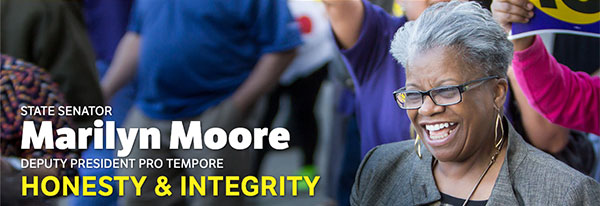|
|||||||||||||||||
|
Chairs of the Energy and Technology Committee, Transportation Committee and the Environment Committee Urge Adoption of Advance Clean Cars II and Clean Trucks Standards


|
|||||||||||||||||
|

HARTFORD – State Senator Saud Anwar (D-South Windsor) today received a score of 95% from the Connecticut League of Conservation Voters (CTLCV) for his support of environmental public policy bills during the 2023 legislative session.
The CTLCV released its annual scorecard today (https://www.ctlcv.org/scorecard2023.html) ranking all Connecticut legislators on their support or opposition to a variety of pro-environmental legislation designed to protect and improve Connecticut’s air, soil and water for generations to come. This year’s Scorecard reviewed votes on 31 different environmental bills to produce the Environmental Score.
In addition to a 95% for his votes on the environment, Sen. Anwar received a 100% “Democracy Score,” earned by voting in approval of three voting rights bills – the CTLCV considers equity and environmental justice impacts in the process of determining its positions on legislation.
“The environment intersects with our daily lives in countless ways – it’s responsible for the air we breathe, the food we grow and eat and the natural beauty of our state,” said Sen. Anwar. “I’m proud to receive this recognition for supporting policies that will benefit the health and safety of Connecticut residents including reducing water pollution, enhancing recycling power and providing more natural outdoor recreation in our communities and I thank the CTLCV for taking notice of these important needs.”
The CTLCV says its biggest legislative wins last session were: Senate Bill 100, Establishing an Account in the General Fund to Provide Grants to Towns that Need PFAS Testing and Remediation; Senate Bill 896, Tree Removal on Properties Controlled by DEEP; Senate Bill 1147, The Environmental Justice Program of DEEP; Senate Bill 1236, Amount of Unclaimed Beverage Container Deposits; House Bill 6480, Working Group on the Restoration of Eel Grass; House Bill 6482, Bonding for Bikeways, Greenways and Recreational Trails; House Bill 6483, Open Space and Watershed Land Acquisition Grant Program; House Bill 6484, Prohibit the Harvesting of Horseshoe Crabs; House Bill 6486, Extended Producer Responsibility for Tires; House Bill 6813, Authorizing the Establishment of a Seabird and Shorebird Protection Program
“CTLCV fights to protect our state’s great natural legacy for future generations. To do this, we must hold our elected officials accountable. This Scorecard shows how your lawmakers voted on key environmental and voting rights bills during the most recent legislative session,” the CTLCV report states. “The good news is that lawmakers were able to achieve wins for wildlife: new laws were passed to help restore eel grass, protect shoreline nesting birds, stop the overharvesting of horseshoe crabs, and reduce “light pollution” detrimental to migratory birds.”
For more than two decades, the CTLCV’s annual Environmental Scorecard rates state legislators on key environmental priorities each year. The CTLCV grades lawmakers on a scale of 0 – 100 based on how they vote on key environmental bills in committees, the House, and the Senate. Their final score represents an average of their votes on those specific bills.

HARTFORD – State Senator MD Rahman (D-Manchester) today received a score of 93% from the Connecticut League of Conservation Voters (CTLCV) for his support of environmental public policy bills during the 2023 legislative session.
The CTLCV released its annual scorecard today (https://www.ctlcv.org/scorecard2023.html) ranking all Connecticut legislators on their support or opposition to a variety of pro-environmental legislation designed to protect and improve Connecticut’s air, soil and water for generations to come. This year’s Scorecard reviewed votes on 31 different environmental bills to produce the Environmental Score.
“Our district is home to beautiful open space, recreation trails that expose the best of Connecticut’s natural beauty and important plant life and wildlife,” said Sen. Rahman. “I voted to protect and support these vital aspects of our community and state and am proud to receive this recognition from the CTLCV. I will work to continue upholding these important values.”
The CTLCV says its biggest legislative wins last session were: Senate Bill 100, Establishing an Account in the General Fund to Provide Grants to Towns that Need PFAS Testing and Remediation; Senate Bill 896, Tree Removal on Properties Controlled by DEEP; Senate Bill 1147, The Environmental Justice Program of DEEP; Senate Bill 1236, Amount of Unclaimed Beverage Container Deposits; House Bill 6480, Working Group on the Restoration of Eel Grass; House Bill 6482, Bonding for Bikeways, Greenways and Recreational Trails; House Bill 6483, Open Space and Watershed Land Acquisition Grant Program; House Bill 6484, Prohibit the Harvesting of Horseshoe Crabs; House Bill 6486, Extended Producer Responsibility for Tires; House Bill 6813, Authorizing the Establishment of a Seabird and Shorebird Protection Program
In addition to a 93% for his votes on the environment, Sen. Rahman received a 100% “Democracy Score,” earned by voting in approval of three voting rights bills – the CTLCV considers equity and environmental justice impacts in the process of determining its positions on legislation. While all Senate Democrats received 100% “Democracy Scores,” only two of 12 Senate Republicans achieved that distinction
“CTLCV fights to protect our state’s great natural legacy for future generations. To do this, we must hold our elected officials accountable. This Scorecard shows how your lawmakers voted on key environmental and voting rights bills during the most recent legislative session,” the CTLCV report states. “The good news is that lawmakers were able to achieve wins for wildlife: new laws were passed to help restore eel grass, protect shoreline nesting birds, stop the overharvesting of horseshoe crabs, and reduce “light pollution” detrimental to migratory birds.”
For more than two decades, the CTLCV’s annual Environmental Scorecard rates state legislators on key environmental priorities each year. The CTLCV grades lawmakers on a scale of 0 – 100 based on how they vote on key environmental bills in committees, the House, and the Senate. Their final score represents an average of their votes on those specific bills.

HARTFORD – State Senator Ceci Maher (D-Wilton) today received a score of 93% from the Connecticut League of Conservation Voters (CTLCV) for her support of environmental public policy bills during the 2023 legislative session.
The CTLCV released its annual scorecard today (https://www.ctlcv.org/scorecard2023.html) ranking all Connecticut legislators on their support or opposition to a variety of pro-environmental legislation designed to protect and improve Connecticut’s air, soil and water for generations to come. This year’s Scorecard reviewed votes on 31 different environmental bills to produce the Environmental Score.
“Our environment is a key component of our future and the future of our children,” said Sen. Maher. “I’m proud to receive high marks in supporting pro-environment policies in our state and am committed to continuing this support. These policies will keep our waters clean, support environmental justice and support open space across the state. I look forward to furthering this important work in the 2024 legislative session.”
The CTLCV says its biggest legislative wins last session were: Senate Bill 100, Establishing an Account in the General Fund to Provide Grants to Towns that Need PFAS Testing and Remediation; Senate Bill 896, Tree Removal on Properties Controlled by DEEP; Senate Bill 1147, The Environmental Justice Program of DEEP; Senate Bill 1236, Amount of Unclaimed Beverage Container Deposits; House Bill 6480, Working Group on the Restoration of Eel Grass; House Bill 6482, Bonding for Bikeways, Greenways and Recreational Trails; House Bill 6483, Open Space and Watershed Land Acquisition Grant Program; House Bill 6484, Prohibit the Harvesting of Horseshoe Crabs; House Bill 6486, Extended Producer Responsibility for Tires; House Bill 6813, Authorizing the Establishment of a Seabird and Shorebird Protection Program; In addition to a 93% for her votes on the environment, Sen. Maher received a 100% “Democracy Score,” earned by voting in approval of three voting rights bills – the CTLCV considers equity and environmental justice impacts in the process of determining its positions on legislation.
“CTLCV fights to protect our state’s great natural legacy for future generations. To do this, we must hold our elected officials accountable. This Scorecard shows how your lawmakers voted on key environmental and voting rights bills during the most recent legislative session,” the CTLCV report states. “The good news is that lawmakers were able to achieve wins for wildlife: new laws were passed to help restore eel grass, protect shoreline nesting birds, stop the overharvesting of horseshoe crabs, and reduce “light pollution” detrimental to migratory birds.”
For more than two decades, the CTLCV’s annual Environmental Scorecard rates state legislators on key environmental priorities each year. The CTLCV grades lawmakers on a scale of 0 – 100 based on how they vote on key environmental bills in committees, the House, and the Senate. Their final score represents an average of their votes on those specific bills.

HARTFORD – State Senator Norm Needleman (D-Essex) today received a score of 94% from the Connecticut League of Conservation Voters (CTLCV) for his support of environmental public policy bills during the 2023 legislative session.
The CTLCV released its annual scorecard today (https://www.ctlcv.org/scorecard2023.html) ranking all Connecticut legislators on their support or opposition to a variety of pro-environmental legislation designed to protect and improve Connecticut’s air, soil and water for generations to come. This year’s Scorecard reviewed votes on 31 different environmental bills to produce the Environmental Score.
“Our environment is Connecticut’s most important resource. Without it, we don’t have clean air, clean drinking water or the wonderful natural forests and rivers so many of us enjoy,” said Sen. Needleman. “I’m grateful to the CTCLV for its vital support of the state’s environment and will continue to work toward legislation protecting our state.”
The CTLCV says its biggest legislative wins last session were: Senate Bill 100, Establishing an Account in the General Fund to Provide Grants to Towns that Need PFAS Testing and Remediation; Senate Bill 896, Tree Removal on Properties Controlled by DEEP; Senate Bill 1147, The Environmental Justice Program of DEEP; Senate Bill 1236, Amount of Unclaimed Beverage Container Deposits; House Bill 6480, Working Group on the Restoration of Eel Grass; House Bill 6482, Bonding for Bikeways, Greenways and Recreational Trails; House Bill 6483, Open Space and Watershed Land Acquisition Grant Program; House Bill 6484, Prohibit the Harvesting of Horseshoe Crabs; House Bill 6486, Extended Producer Responsibility for Tires; House Bill 6813, Authorizing the Establishment of a Seabird and Shorebird Protection Program; In addition to a 93% for her votes on the environment, Sen. Maher received a 100% “Democracy Score,” earned by voting in approval of three voting rights bills – the CTLCV considers equity and environmental justice impacts in the process of determining its positions on legislation.
In addition to a 94% for his votes on the environment, Sen. Needleman received a 100% “Democracy Score,” earned by voting in approval of three voting rights bills – the CTLCV considers equity and environmental justice impacts in the process of determining its positions on legislation.
For more than two decades, the CTLCV’s annual Environmental Scorecard rates state legislators on key environmental priorities each year. The CTLCV grades lawmakers on a scale of 0 – 100 based on how they vote on key environmental bills in committees, the House, and the Senate. Their final score represents an average of their votes on those specific bills.

|
|||||||||||||||||
|

Today, state Senator Saud Anwar (D-South Windsor) welcomed an announced $660,000 in funding to East Hartford school districts to support and expand enhanced tutoring to improve student outcomes, especially in mathematics. The funding comes through the state’s High-Dosage Tutoring Program, which is intended to provide students with additional educational opportunities and address education disparities across the state.
East Hartford Public Schools will receive $420,000, supporting tutoring for 336 students, while the Goodwin University Educational Services district, also located in East Hartford, will receive $240,000, supporting the tutoring of 120 students.
“As we work to support students and improve their educational outcomes statewide, I’m heartened to know hundreds of local students will get this key in-school support,” said Sen. Anwar. “I’m grateful to Governor Lamont and the Education Department for their support of our community. This tutoring will provide real advantages for students throughout the school year.”
“The need for robust accelerated learning interventions in response to the COVID-19 pandemic has never been greater, and by dedicating this funding to create an intensive tutoring program, we can provide school districts with greater support to identify students who are struggling and connect them with the resources they need to succeed,” Governor Lamont said.
This funding will target tutoring for students in middle and high school with a primary focus on improving mathematics proficiency. It comes as state data shows that while there have been improvements in mathematics education across the state in the last year, more work can be done, and in-person, in-school tutoring is the most effective way to address this learning gap.
Schools receiving the funds are committed to using it to integrate or expand in-person tutoring during school hours, with work beginning by January 2024. The state will also monitor the effectiveness of this tutoring with the intent to inform all school districts in how to most effectively support students.
To learn more about the Connecticut High-Dosage Tutoring Program, visit this link: https://portal.ct.gov/sde/covid19/acceleratect/high-dosage-tutoring.

Today, state Senator Martha Marx (D-New London) welcomed an announced $1,031,315 in funding to local school districts to support and expand enhanced tutoring to improve student outcomes, especially in mathematics. The funding comes through the state’s High-Dosage Tutoring Program, which is intended to provide students with additional educational opportunities and address education disparities across the state.
East Lyme Public Schools will receive $491,315 to support tutoring of 277 students, while New London Public Schools will receive $540,000 to support tutoring of 432 students.
“Supporting local education is a vital need in our communities, and I’m glad to know this funding is going to support students directly in classrooms, providing them support that’s been tested and proven to work,” said Sen. Marx. “I’m grateful to Governor Lamont and the State Department of Education for their support of the 20th Senate District.”
“The need for robust accelerated learning interventions in response to the COVID-19 pandemic has never been greater, and by dedicating this funding to create an intensive tutoring program, we can provide school districts with greater support to identify students who are struggling and connect them with the resources they need to succeed,” Governor Lamont said.
This funding will target tutoring for students in middle and high school with a primary focus on improving mathematics proficiency. It comes as state data shows that while there have been improvements in mathematics education across the state in the last year, more work can be done, and in-person, in-school tutoring is the most effective way to address this learning gap.
Schools receiving the funds are committed to using it to integrate or expand in-person tutoring during school hours, with work beginning by January 2024. The state will also monitor the effectiveness of this tutoring with the intent to inform all school districts in how to most effectively support students.
To learn more about the Connecticut High-Dosage Tutoring Program, visit this link: https://portal.ct.gov/sde/covid19/acceleratect/high-dosage-tutoring.
Today, state Senator MD Rahman (D-Manchester) welcomed an announced $185,000 in funding to local school districts to support and expand enhanced tutoring to improve student outcomes, especially in mathematics. The funding comes through the state’s High-Dosage Tutoring Program, which is intended to provide students with additional educational opportunities and address education disparities across the state.
Glastonbury Schools will receive $85,013, supporting tutoring of 48 students, while Manchester Schools will receive $100,000, supporting tutoring of 80 students.
“We need to provide every advantage and resource we can to support our students and help our state’s educational strengths,” said Sen. Rahman. “It’s reassuring to know students will get aid right in their classrooms, which will help them better succeed. I’m grateful to Governor Lamont and the state Education Department for these important community resources.”
“The need for robust accelerated learning interventions in response to the COVID-19 pandemic has never been greater, and by dedicating this funding to create an intensive tutoring program, we can provide school districts with greater support to identify students who are struggling and connect them with the resources they need to succeed,” Governor Lamont said.
This funding will target tutoring for students in middle and high school with a primary focus on improving mathematics proficiency. It comes as state data shows that while there have been improvements in mathematics education across the state in the last year, more work can be done, and in-person, in-school tutoring is the most effective way to address this learning gap.
Schools receiving the funds are committed to using it to integrate or expand in-person tutoring during school hours, with work beginning by January 2024. The state will also monitor the effectiveness of this tutoring with the intent to inform all school districts in how to most effectively support students.
To learn more about the Connecticut High-Dosage Tutoring Program, visit this link: https://portal.ct.gov/sde/covid19/acceleratect/high-dosage-tutoring.
|
|||
|